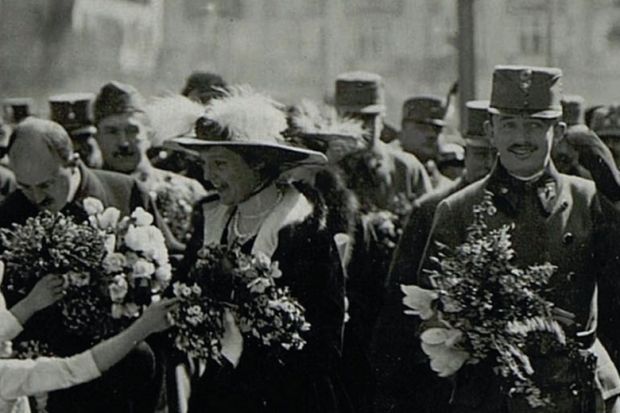A common caricature of the Habsburg Empire portrays it as an anachronism, which, after the demise of that previous anachronism, the Holy Roman Empire, persisted as the Austrian and finally as the Austro-Hungarian Empire into the 20th century. Incapable of solving the problems posed by its diverse and complex ethnic and cultural elements, it staggered along under antiquated imperial rule until its desperate situation impelled its political and military leadership to lead Europe into the First World War.
In this spectacularly revisionist study, Pieter Judson argues that, to the contrary, the empire was a force for progress and modernity. Basing his arguments on extensive recent research by himself and other historians of Central and Eastern Europe, he suggests that, under successive monarchs, the Habsburg realms became an efficiently administered state with a thriving economy and culture in which citizens, rather than subjects, of differing ethnic groups benefited from “shared imperial institutions, administrative practices, and cultural programmes” that helped to shape local society in every corner of the empire.
Judson describes the attempts to weld the disparate Habsburg territories into an empire with common institutions, beginning with the revolutions from above imposed by the enlightened 18th-century rulers Maria Theresa, Joseph II and Leopold II, who promoted economic and social reforms and rational administration. Their reforms faced major obstacles in the multiplicity of languages, cultures, religions and traditions and in the vested interests and privileges of local nobilities and diets. This wave of reform ended with the French Revolution and the wars that followed, after which the Austrian Empire had no appetite for change and became a byword for conservatism.
The great challenge to the empire came with the revolutions of 1848 and, in a splendid chapter, Judson depicts and analyses the heterogeneous mix of opposed forces and ideas the revolutions brought together. He concludes that, although liberals, federalists, pan-Germans and Czech nationalists may have opposed each other, few of those pressing for greater rights for their ethnic groups – with exceptions such as the Italians and Hungarians – were actively disloyal to dynasty or empire. Most wished to reform the imperial state along lines acceptable to their own cause and saw the monarchy as their protector.
The revolutions demonstrated both the problems of the Habsburg Empire and the lack of an alternative to it; the very complexity of the ethnic map made many parts of the empire accept the context of imperial institutions.
A new era of efforts to create a viable Austrian Empire foundered with defeats in wars, the expulsion of the empire from greater Germany, and the endemic hostility of Hungary. But although the dual Austro-Hungarian monarchy that came about in 1867 weakened the unity of the state, the empire held together and, despite national problems remaining endemic, Judson points to the positive methods that were employed to negotiate cultural differences and organise political and social institutions around them.
This is a bold and refreshing book, if at times hard going for those of us not familiar with the complex ethnic and linguistic map of the Habsburg lands, a complexity that requires each town to have at least two (and more often three) names.
Judson does much to destroy the picture of an ossified regime and state, and although his revisionism may take too benign a view of the empire, he demonstrates that it was a much more civilised state than the successors that would be so ill-advisedly created by the Paris Peace Settlement of 1919.
A. W. Purdue is visiting professor of history, Northumbria University.
The Habsburg Empire: A New History
By Pieter M. Judson
Harvard University Press, 592pp, £25.00
ISBN 9780674047761
Published 28 April 2016
Register to continue
Why register?
- Registration is free and only takes a moment
- Once registered, you can read 3 articles a month
- Sign up for our newsletter
Subscribe
Or subscribe for unlimited access to:
- Unlimited access to news, views, insights & reviews
- Digital editions
- Digital access to THE’s university and college rankings analysis
Already registered or a current subscriber?




